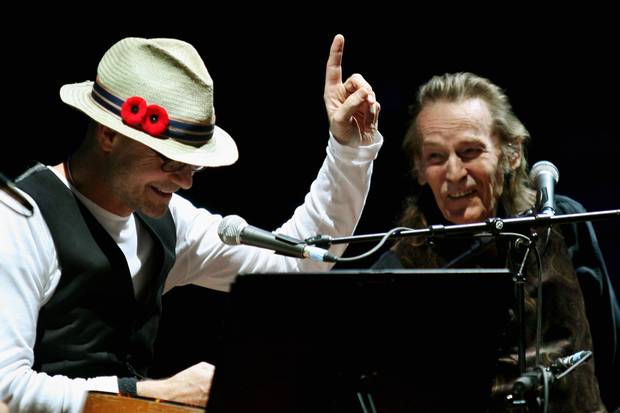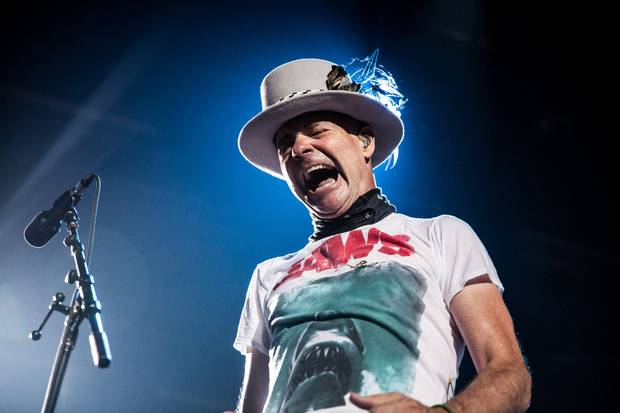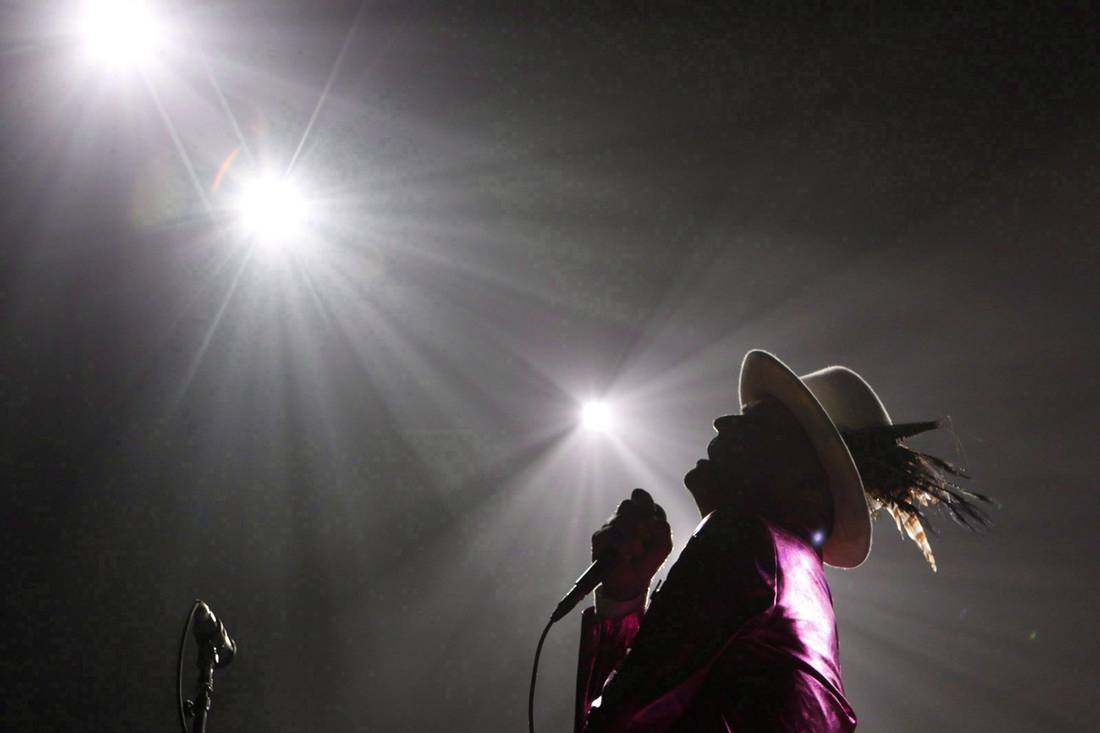On April 6, 1990, the Tragically Hip's Gord Downie was an intriguing singer on the upswing, not yet the Canadian-rock laureate he would later become. In between songs at the Misty Moon music room in Halifax, with his dark brown bangs matted in sweat against his forehead, a loose-limbed Mr. Downie spoke to a writhing crowd. After describing the Nova Scotian capital as the "Paris of the Maritimes," the wild-eyed frontman continued. "I can stroke you people all night long," he said, "with little things about where you live."
It was a spur of the moment remark at the time, but the boast was verifiable and career-defining. Over the course of a robustly artistic life he would lyrically caress a country, whether rhyming "Jacques Cartier" with "right this way," or singing about a late-breaking story on the CBC.
With the breezy strum of Bobcaygeon he and the Tragically Hip put a small Ontario summer town on the map, and with a song much more rugged, Fifty-Mission Cap, a buried piece of hockey lore was anthemically conveyed:
Bill Barilko disappeared that summer / He was on a fishing trip
The last goal he ever scored / Won the Leafs the cup
But if Mr. Downie stroked a nation, he struck it too. On the Hip's Born in the Water, a pro-English language resolution passed by a spiteful city council in Sault Ste. Marie, Ont., was sharply – "passing laws, just because" – rebuked.
And with Mr. Downie's poignant, powerful solo album Secret Path from 2016, the story of a 12-year-old Ojibwa boy who died in 1966 was used to address a government's harsh assimilation of Indigenous children.
‘His efforts will not go unnoticed’: Gord Downie’s Secret Path shines a light on First Nations and residential schools
Mr. Downie, an imaginative songwriter, inimitable live performer, environmentalist, advocate for First Nations people and published poet, died on Oct. 17 surrounded by his family and children, the Tragically Hip announced in a statement. He was 53. He succumbed to glioblastoma, an aggressive, incurable form of brain cancer that was diagnosed in December of 2015.
Mr. Downie recorded 14 albums with the Tragically Hip, a Kingston-born alt-rock quintet composed of guitarists Rob Baker and Paul Langlois, bassist Gord Sinclair, drummer Johnny Fay and the singer-lyricist Mr. Downie. Formed in 1983, the Hip was at the forefront of a movement that saw Canadian rock bands beginning to write original songs about their country. The band would rise from bar-band oddballs to an arena-filling act, capturing 16 Juno Awards along the way.
More importantly, the Hip challenged conventions. If the music itself wasn't necessarily progressive, as an artist Mr. Downie possessed a non-conformist's vital energy. "He certainly made a great contribution to songwriters in this land," said John Samson, a singer-lyricist with Winnipeg's writerly band the Weakerthans. "The Hip made all the difference. There was suddenly less striving, less grasping. People were more comfortable with who they were and where they came from."
A notebook-filling lyricist, Mr. Downie released five solo albums, including 2001's Coke Machine Glow, also the title of a book of poetry simultaneously released. A line from his poem Michigan Gig was strong: "My songs were built to fight wars."
He studied film at Queen's University; his filmography included cameo roles in Men with Brooms, the Trailer Park Boys movie The Big Dirty and television's Corner Gas. In 2002, he was featured in a short-film adaptation of At the Quinte Hotel, a poem by Al Purdy, an artistic hero of the singer.
On stage, Mr. Downie was as much a performance artist as a vocalist. Responding to the urge of the music, he presented an in-the-moment, mime-like aesthetic. "I think I'm a dancer in terms of what I do onstage," he said in 2010, speaking about Beside Each Other, a collaboration with choreographers Andrea Nann and Brendan Wyatt that earned him a Dora award nomination. "I love dance – trying to express myself wordlessly."
For his words and not, Mr. Downie will be remembered as an artist whose offbeat charisma and edgy talent appealed to the highbrow as well as to the hoi polloi. He was an impressionistic songwriter whose songs referenced rocky sockets off the coast of France and constellations revealing themselves for the very first time. Mentioning the Canadian novelist Hugh MacLennan here and the Canadian painter Tom Thomson there, he was a rock star who viewed his country through a distinctly poetic lens.
Born on Feb. 6, 1964, in Amherstview, Ont., outside Kingston, Gordon Edgar Downie was the fourth of Edgar and Lorna Downie's five children. One classmate remembered him as a boy with a Cheshire grin, his mischievous expression hinting at things he knew that others did not.
As an adult, Mr. Downie was a board member of the charity group Lake Ontario Waterkeeper. In his youth he whiled away his time on the lake. "As kids, we spent every waking moment up and down the rocky shore," he told his friend Joseph Boyden, the author, in an interview for Macleans magazine in 2009. "We used to tie a skipping rope to a pitchfork and try to spear big carp. We never got one."
Mr. Downie's godfather was Harry Sinden, a friend of the family who would go on to coach Team Canada in the summit series against the Soviet nation team in 1972 and coach and manage the National Hockey League's Boston Bruins.
As a fan of those Bruins, young Downie began a short-lived hockey career as a defenceman – wearing Bobby Orr's No. 4 – before quickly moving to goalie.
"I really got into the nobility of it, what Jacques Plante would call the noblest position in all of sports," Mr. Downie told hockey writer Bob McKenzie. "I felt it was the position where you could be the cause, where you could have the biggest effect on the game. I liked everything about it."
As a bantam, the boy who would grow up to write The Lonely End of the Rink (a song about his father) was the puck-stopper for an Ernestown team that won a provincial B championship. Later he played basketball at Kingston Collegiate, but by that time his focus had shifted from playing sports to playing in a band. Tragically Hip drummer Mr. Fay once told the Globe and Mail a story about the teenaged Downie skipping out on a high-school basketball game because of a gig. "The coach told him that he would need to make a choice," Mr. Fay said. "He chose music."
The music he chose was bluesy rock, though his first gigs were as singer for punk cover bands the Slinks and the Filters in Kingston. Larry Stafford, a local musician and sound engineer, spoke to the Kingston Whig-Standard recently about a Filters' out-of-town show. "I went up to the room just to see how everybody was, and they were all sitting on the floor," recalled Mr. Stafford, speaking about the Filters. "In the room was a mattress and a rope attached to the wall for a fire escape, and they were just sitting there and Gord Downie looked at me and said, 'So, is this as good as it gets?' "
It got better.
The Hip formed in the early 1980s at Queen's University, where Mr. Sinclair, Mr. Baker and Mr. Downie were students of the long-haired kind. "I was in film school at Queen's, which sounds stupid to say because I wasn't really," Mr. Downie recalled in the book Have Not Been the Same: The CanRock Renaissance, 1985-1995. "I had a student card, and did pay my tuition eventually. Once we got together, formal education was the first casualty."
(In fact, Mr. Downie did graduate.)
The band's set list typically consisted of obscure covers of songs by the Yardbirds, the Doors, the Animals, Van Morrison and early Rolling Stones. Taking its name from Michael Nesmith's 1982 long-form music video Elephant Parts, the Tragically Hip became a fixture at campus pubs such as Alfie's. "Gord was mesmerizing," says Janet Suchanek, a student manager at the bar in the mid '80s. "He was immersed in the music. He was all-out."
Off campus, the Hip was viewed with skepticism. "Within Kingston, there were some who thought we were a university, frat-boy band, too smart for our own good," Mr. Downie said in Have Not Been the Same. "And then obviously others thought we were working-class bums."
That dichotomy never really left the Hip – riff-based, average-Joe alt-rockers led by the enigmatic and hyper-literate Mr. Downie. "The Hip have this broad appeal," Jim Cuddy of Blue Rodeo told interviewer George Stroumboulopoulos recently. "They're the Monkees of hoser intellectual rock."
After the release of a self-titled EP in late 1987, the Hip signed a record deal with MCA, the major label under which the band's debut LP Up to Here was issued in 1989. Mr. Downie, who early on scored lead-singing slots because of his prodigious memory – "I could memorize huge quantities of lyrics, mostly the Doors" – was finding his feet as a lyricist.
The band's first hit was New Orleans is Sinking, a swampy, snake-charming vamp in which Mr. Downie growled low-to-the-ground lines about "bourbon blues on the street, loose and complete, under skies all smoky blue-green." This was sound and colour in the tradition of Delta blues, a music he adored.
As a singer, Mr. Downie's voice was the opposite of smooth yet ready to serve the purpose of presenting his songs. His drawling baritone had a hard, quivering tone that rang in the air with an odd sort of agitation attached – as if rats were gnawing at his toes and strange visions were racking his brain. On stage, especially early in his career, he was given to fevered, mid-song flights of impromptu soliloquy, such as the one captured on the "Killer Whale Tank" version of New Orleans is Sinking.
With subsequent albums Road Apples (1991), Fully Completely ('92) and Day for Night ('94), the Hip's audience grew steadily while Mr. Downie's game-changing lyrical Canadiana and cryptic historical references endeared the group to home-country fans but failed to connect with an American audience.
Beyond the music, the group and Mr. Downie developed a reputation as being generous with fans and considerate to other bands. "They broke down those divisions between band and crew, between band and public, between band and the people who work at the venues," Sam Roberts said on a special edition of CBC Radio's The Strombo Show that was dedicated to the Hip early in 2017. "Everywhere that they went, there was this spirit of inclusiveness."
The Hip championed Canadian bands on its travelling festivals in the 1990s, dubbed Another Roadside Attraction. After an unruly audience on Canada Day in 1994 threw objects at singer-songwriter Jane Siberry and Daniel Lanois's band at Molson Park in Barrie, Ont., an angry and ashamed Mr. Downie derisively dedicated the Hip's first song to the louts "who throw [things] at musicians."
On the 1997 concert album Live Between Us, Mr. Downie is heard saluting the opening band, the Rheostatics: "We're all richer for having seen them tonight," he declared to the crowd.
When it came to time with his fans, Mr. Downie was giving and accessible, often signing autographs with his ever-present four-colour Bic pen. "If you put in a little bit of effort as a fan, I think Gord and the band recognized that you were putting yourself out there," said Joshua Kloke, author of Escape is at Hand, a book based on his fandom of the Hip. "I think they saw that you were putting yourself in a vulnerable position."

Feb. 4, 2010: Gord Downie and Gordon Lightfoot perform together at the Toronto Centre For the Arts.
DAVE CHAN FOR GLOBE AND MAIL
With the Hip firmly established as CanRock elders, Mr. Downie made his home in Toronto. There he was drawn to the city's sprawling indie-music community, within which he collaborated in between Hip projects with local musicians to tour and release artful solo albums in the 2000s, accompanied by his backing band Country of Miracles.
In 2014, he released And the Conquering Sun, a hard-driving LP with the psychedelic-country group the Sadies. "I wanna be known as a guy who gives a shit," Mr. Downie sang on the album's Los Angeles Times, "who has contact with his life."
Two years earlier, while promoting the Hip album Now for Plan A, Mr. Downie revealed that that record was influenced by his wife's successful battle with cancer. In the spring of 2016, it was revealed that he himself had been undergoing treatment for terminal brain cancer since suffering a seizure in late 2015.
Prior to the illness, Mr. Downie had recorded two albums, including the Hip's Man Machine Poem and the solo concept record Secret Path. Both would be released in 2016.
A series of summer concerts by the Hip was seen by fans as a last waltz. The tour's last concert, in Kingston on Aug. 20, was carried live by the CBC, with the broadcast aired in pubs, parks and drive-in movie theatres across the country.
Because his illness and brain surgeries had affected his memory, Mr. Downie relied on teleprompters to remind him of words which those in attendance had no trouble at all recalling.
The concert event galvanized a nation. More an 11 million people took in the commercial-free broadcast across all multiple platforms, with fans celebrating the band's music while simultaneously mourning the impending loss of the beloved singer-lyricist. The New York Times reported on "an unparalleled moment of national pride laced with sorrow."
’Your music inspires me’: Tragically Hip fans send messages to Gord Downie
The fall of 2016 saw the release of Secret Path, an intimate and important record that was accompanied by a graphic novel by Mr. Downie and the artist Jeff Lemire and an animated film aired on CBC. The album was a short-listed nominee for the 2017 Polaris Prize.
The recording, book and film told the tragic true story of Chanie Wenjack, who ran away from a residential school in Northern Ontario in 1966 and died of exposure alongside a railway track, trying in vain to walk back home to his family, some 600 kilometres away.
A new studio album from Mr. Downie, Introduce Yerself, a double disc of 23 songs recorded over two four-day sessions in January, 2016, and February, 2017, is set to be released Oct. 27.
In a 2009 interview with the CBC, Mr. Downie downplayed any suggestion that he was any sort of cheerleader for Canada. "I would want no part of propagating or galvanizing or burnishing some of the stupid mythology in this country," he said. "That we're this clean pristine place. That we've got it all figured out."
With Secret Path, his proudest project, Mr. Downie presented an uncomfortable truth about his country. "If this is the last thing I do," he told The Globe, "then I'm happy."
GORD DOWNIE'S LIFE AND LEGACY: MORE FROM THE GLOBE AND MAIL
Tearful Trudeau says Canada ‘less as a country without Gord Downie’







